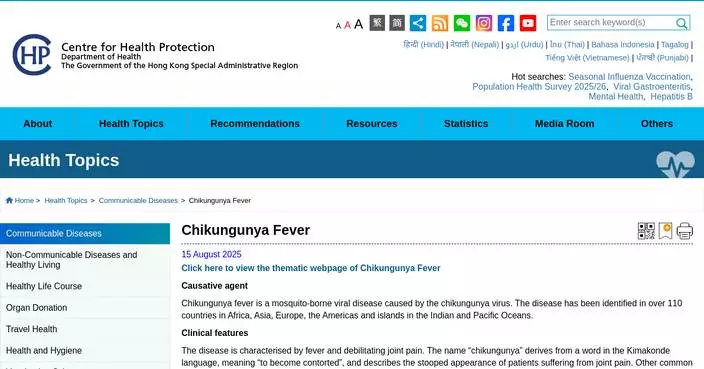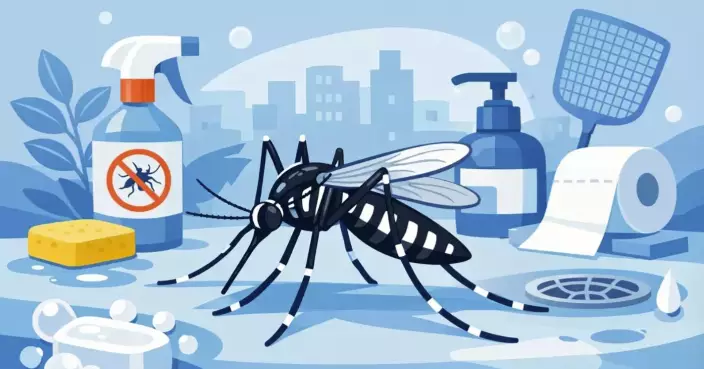CHP reminds public of precautions against cold weather
The Centre for Health Protection (CHP) of the Department of Health (DH) today (February 8) reminded the public, particularly the elderly and people with chronic illnesses, to adopt appropriate measures to protect their health in view of the cold weather.
Cold weather can easily trigger or exacerbate diseases, especially among the elderly and persons suffering from heart disease, respiratory illnesses or other chronic illnesses.
Elderly people have less insulating fat beneath their skin to keep them warm, and their body temperature control mechanisms may be weaker. Their bodies may not be able to respond appropriately to cold weather.
Some senior persons may have decreased mobility, which can impair their ability to generate and conserve body heat. Chronic illnesses, such as hypertension, diabetes and endocrine disorders, may undermine the health of elderly people and lower their metabolic rate, subsequently causing their bodies to generate less heat. Persons with chronic illnesses, such as chronic respiratory illnesses or heart disease, are vulnerable to disease aggravation due to cold weather.
The CHP reminded the public, in particular the elderly and persons with chronic illnesses, to adopt the following preventive measures:
Take note of the weather forecast. Wear warm clothing, including hats, scarves, gloves and socks, accordingly;
Consume sufficient food to ensure adequate calorie intake;
Perform regular exercise to facilitate blood circulation and heat production;
Stay in a warm environment and avoid prolonged outdoor exposure;
Use heaters with care and maintain adequate indoor ventilation; and
Seek medical advice if feeling unwell.
In addition, the public should avoid alcoholic beverages.
Drinking alcohol does not keep you warm. Alcohol accelerates the loss of body heat through dilated blood vessels, resulting in chilling instead.
Parents should ensure that babies are sufficiently warm, but it is also important to keep babies relatively lightly clothed to avoid overheating.
Parents should observe the following safety measures when putting their children to bed:
Keep the room well ventilated and at a comfortable temperature;
Always place babies on their backs to sleep. Leave their heads, faces and arms uncovered during sleep;
Babies do not need pillows. Place babies on a firm and well-fitted mattress to sleep. Avoid soft objects, pillows and loose bedding;
Let babies sleep in a cot placed near their parents' bed; and
Maintain a smoke-free environment.
In addition, many respiratory pathogens, including influenza and SARS-CoV-2, may have increasing activity and community transmission during winter. Seasonal influenza vaccination is recommended for all persons aged 6 months or above, except those with known contraindications. Persons at higher risk of influenza and its complications, including the elderly and children, should receive seasonal influenza vaccinations early. Please see details of the vaccination schemes on theCHP'swebsite.
A person infected with influenza and COVID-19 at the same time may be more seriously ill and have a higher risk of death. It is important for elderly persons, especially those residing in residential care homes, to receive both seasonal influenza and COVID-19 vaccinations. They should also receive an additional booster against COVID-19 according to recommendations as soon as possible. The public should also maintain good personal and environmental hygiene against respiratory illnesses and note the following:
Surgical masks can prevent the transmission of respiratory viruses from ill persons. It is essential for persons who are symptomatic (even if having mild symptoms) to wear a surgical mask;
Wear a surgical mask when taking public transport or staying in crowded places. It is important to wear a mask properly, including performing hand hygiene before wearing and after removing a mask;
Avoid touching one's eyes, mouth and nose;
Wash hands with liquid soap and water properly whenever possibly contaminated;
When hands are not visibly soiled, clean them with 70 to 80 per cent alcohol-based handrub;
Cover the mouth and nose with tissue paper when sneezing or coughing. Dispose of soiled tissue paper properly into a lidded rubbish bin and wash hands thoroughly afterwards;
Maintain good indoor ventilation;
When having respiratory symptoms, wear a surgical mask, refrain from work or attending classes at school, avoid going to crowded places and seek medical advice promptly; and
Maintain a balanced diet, exercise regularly, take adequate rest, do not smoke and avoid overstress.
Food-borne diseases, particularly those linked to hotpot cuisine, are also common in cold weather. The following preventive measures should be taken:
Wash hands before handling and consuming food;
Do not patronise unlicensed vendors or those with poor hygienic standards while selecting food;
Wash and cook all food thoroughly;
Vegetables should be washed thoroughly in clean running water before cooking and consumption. When appropriate, scrub hard-surfaced vegetables with a clean brush to remove dirt and substances, including pesticide residues and contaminants, from surfaces and crevices;
Shrimps should be fully cooked until the shells turn red and the flesh turns white and opaque;
For shellfish such as scallops and geoduck, scrub the shells thoroughly and remove the internal organs;
Do not eat any undercooked freshwater aquatic products. To ensure that the food is thoroughly cooked, the centre of the food should reach a temperature of at least 75 degrees Celsius to destroy pathogen;
Most hotpot ingredients should be stored in a refrigerator at 4 degrees C or below, while frozen food should be stored in a freezer at -18 degrees C or below;
Never use raw eggs as a dipping sauce for hotpot; and
Use different sets of chopsticks to handle raw and cooked food to avoid cross-contamination.
In addition, when using fuel-burning appliances, especially in indoor areas, the public should ensure adequate ventilation to avoid harmful exposure to carbon monoxide (CO) and prevent CO poisoning.
For more health information, the public may call the DH's Health Education Infoline (2833 0111) or visit theCHP's websiteandFacebook Fanpage.
The public may also call Dial-a-Weather (1878 200) or visit thewebsite of the Hong Kong Observatoryfor the latest weather information and forecasts, or itspage on Weather Information for Senior Citizens.
Speech by CS at Nobel Heroes Forum: Shaping Science and Future
Following is the speech by the Chief Secretary for Administration, Mr Chan Kwok-ki, at the Nobel Heroes Forum: Shaping Science and Future today (January 12):
Dr Wong (Chairman of the University of Hong Kong (HKU) Council, Dr Peter Wong), Professor Zhang (President and Vice-Chancellor of the HKU, Professor Zhang Xiang), Mr Turner (Executive Director of Foundation Lindau Nobel Laureate Meetings, Mr Nikolaus Turner), distinguished Nobel Laureates, esteemed scientists,ladies and gentlemen,
Good morning. It is my great pleasure to join you today for the Nobel Heroes Forum: Shaping Science and Future.
To our Nobel Laureates – we are truly privileged to have you with us. You represent the very best of human curiosity and perseverance. Your ground-breaking work expands our understanding of the universe, lights the path for future discovery, and inspires generations. Thank you for joining this extraordinary gathering.
And to all our distinguished guests from around the world – a very warm welcome to Hong Kong.
Today's dialogue is more than an academic event. It is a powerful convergence of the world's finest scientific minds, right here in a city that is determined to play its part in global innovation.
Hong Kong's mission is clear and unwavering: to become a premier international innovation and technology centre. A hub where top scientists, scholars and entrepreneurs can thrive, collaborate and serve the world.
To achieve this, the Government is fully committed. We are building a world-class ecosystem and nurturing the talent to power it.
First, we are building the infrastructure for greatness.
We have established a strategic I&T framework centred on three major I&T (innovation and technology) parks and five key research and development institutions.
Building on the success of the Science Park and Cyberport, we officially launched the Hong Kong Park of the Hetao Shenzhen-Hong Kong Science and Technology Innovation Co-operation Zone last month.
The Hetao Co-operation Zone is a major co-operation platform in the Guangdong-Hong Kong-Macao Greater Bay Area under the National 14th Five-Year Plan. The Hong Kong Park is envisioned as a world-class hub for technological innovation, connecting the Chinese Mainland with the international community, and serving as an important source for fostering new quality productive forces.
Together with our five key R&D (research and development) institutions focus on frontier technologies, these developments will create more favourable conditions for Hong Kong to attract global I&T resources and talent.
Second, we are investing decisively.
We back our words with resources. We have launched significant funding schemes across the entire innovation chain.
To support excellent and impactful research, the Research Grants Council (RGC) under the University Grants Committee administers more than 20 competitive research grant and fellowship schemes.
Furthermore, last year we launched the 3 billion HK dollars Frontier Technology Research Support Scheme to empower ground-breaking basic research led by world-class researchers and academics.
To accelerate the midstream and downstream development, we rolled out three separate 10 billion HK dollars initiatives to drive the commercialisation of R&D outcomes and new industrialisation.
Third, and most crucially, we are nurturing and attracting top talent.
Talent is our ultimate driving force. We are expanding our talent pool through multiple strategies.
On nurturing young research talent, the Government has launched the Young Collaborative Research Grant to support early-stage researchers in leading and managing collaborative research. We are also actively fostering research collaboration between Hong Kong, the Chinese Mainland and overseas research funding agencies through operating various Joint Research Schemes. These partnerships not only foster academic exchange but also provide opportunities to nurture researchers in exploring new frontiers in their respective fields.
On attracting global talent, the RGC Junior Research Fellow Scheme has supported some 300 doctoral graduates from Hong Kong and around the world to pursue research careers at our universities.
Our international research flagship, the InnoHK research clusters, is also there to bring together brilliant minds from all over the world to conduct world-class scientific research. To date, our two existing InnoHK research clusters – one focusing on healthcare technology and another on AI and robotics – have successfully built links with over 30 world-class universities and research institutes from 12 economies, pooling together around 3 000 researchers locally and across the globe.
To go further, the Government is now expediting the development of the third InnoHK research cluster, with the focus on sustainable development, energy, advanced manufacturing and materials.
Our strategy follows a powerful cycle: promoting technology with talent, leading industries with technology, and attracting talent with industries.
And we are seeing results. Hong Kong ranks third globally in "Technology" in the World Digital Competitiveness Ranking. The Shenzhen-Hong Kong-Guangzhou cluster ranks first in the 2025 Global Innovation Index Ranking of the World's Top 100 innovation clusters.
Our startup community has grown nearly fivefold in the past decade, producing homegrown unicorns.
This progress is no accident. It is built on Hong Kong's unique strengths. Under "one country, two systems", we enjoy unwavering national support and unparalleled global connectivity. Our robust rule of law, free-flowing capital and vibrant multicultural society make Hong Kong the perfect incubator for scientific exploration and technological breakthroughs.
To every scientist, researcher and innovator here today: Hong Kong is open for you. We provide the platform, the funding, the freedom and the connections to turn visionary ideas into reality.
We invite you to build your legacy here. To join us in shaping not just the future of Hong Kong, but the future of science for humanity.
On this note, let the dialogue begin. I look forward to the fruitful and inspirational exchanges. Thank you.

Source: AI-found images










